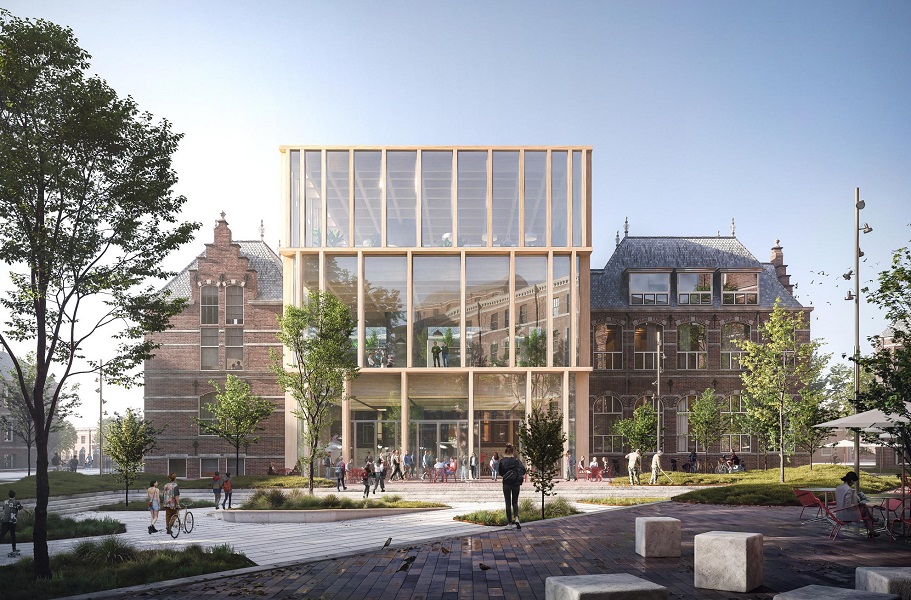
University of Groningen
The University of Groningen is one of the top research universities in the Netherlands, consistently ranking among the top 100 universities in the world, The university has around 30,000 students enrolled, including over 6,000 international students from more than 120 countries, They offer various undergraduate and graduate programs across the humanities, social sciences, natural sciences, engineering, and medicine.
Notable academic strengths include engineering, physics, astronomy, economics, and language studies.
The University of Groningen is consistently ranked as one of the most sustainable universities in the world due to its commitment to environmental initiatives.
Research
As a research-intensive university, Groningen has a strong focus on cutting-edge research across diverse disciplines. It hosts several world-class research institutes, such as the Stratingh Institute for Chemistry and the UMCG Medical Center, The university has several prestigious research institutes, including the Zernike Institute for Advanced Materials and the Kapteyn Astronomical Institute.
Researchers at Groningen have made significant contributions in areas like sustainable energy, healthy aging, and data science. The university actively collaborates with industry partners and has a robust technology transfer program to commercialize research.
Research Strengths
The university has several research areas that are internationally recognized for their excellence, including:
Physics and Materials Science (e.g., the Zernike Institute for Advanced Materials)
Astronomy and Astrophysics (e.g., the Kapteyn Astronomical Institute)
Energy and Sustainability (e.g., the Energy Academy Europe)
Life Sciences and Healthy Aging (e.g., the UMCG medical research center)
Economics and Business (e.g., the Faculty of Economics and Business)
Digital Humanities and Computational Social Sciences
Research Funding
The University of Groningen receives significant research funding from the Dutch government, as well as from external sources like research councils, the European Union, and industry partners.
In 2022, the university’s total research budget was over €400 million, allowing it to invest in state-of-the-art research facilities and equipment. The University of Groningen has access to advanced research infrastructure, including high-performance computing clusters, specialized laboratories, and cutting-edge scientific instrumentation. It supports a vibrant research ecosystem, with numerous interdisciplinary research centers, institutes, and collaborative platforms.
Research Output and Impact
Researchers at the University of Groningen have significantly contributed to their respective fields, publishing extensively in high-impact journals, The university’s research publications are highly cited, reflecting the quality and influence of its scholarly work.
Groningen researchers have been recognized with prestigious awards and honors, including several Nobel Prizes, Spinoza Prizes, and ERC Grants. The university’s research has led to numerous patents, spin-off companies, and successful technology transfer and commercialization efforts.
Research Culture and Collaboration
The University of Groningen fosters a dynamic and collaborative research environment, encouraging interdisciplinary collaboration and exchanging ideas, Researchers at Groningen work closely with international partners, participating in global research networks and joint projects.
The university actively supports the professional development of its researchers, offering training, mentorship, and funding opportunities to enhance their research capabilities. The University of Groningen also places a strong emphasis on research ethics and integrity, upholding the highest standards of responsible conduct in research.
Campus Facilities and Student Life
The main campus is located in the historic city center of Groningen, with many buildings dating back centuries, In recent years, the university has invested heavily in modern, state-of-the-art facilities to support its research and teaching.
Key campus buildings include the Harmony Building (a historic academic complex), the Zernike College (for science and engineering), and the University Library, There are several other campuses and locations throughout the city, including the University Medical Center Groningen, Major facilities available to students include libraries, computer labs, sporting complexes, arts and music venues, and student housing. The university is known for its vibrant student life, with over 120 student associations and organizations catering to diverse interests.
Popular student activities include sailing, rowing, theater, music, and an active Greek life. Housing for students is readily available, both on campus and in the city, Groningen is a very bicycle-friendly city, making it easy for students to get around.
The university has a strong commitment to internationalization and has made significant investments to support its English-medium instruction. This includes providing language support services, organizing cultural and social events for international students, and ensuring that campus facilities and resources are accessible to students from diverse backgrounds
Admission requirements
Undergraduate Programs
- Secondary school diploma or equivalent, such as a high school diploma or International Baccalaureate (IB)
- Meeting the specific subject requirements for the desired program (e.g., prerequisites in mathematics, sciences, or languages)
- Proficiency in English demonstrated through standardized test scores (e.g., IELTS, TOEFL, or Cambridge English)
- Minimum grade point average (GPA) or equivalent, typically around 6.5 out of 10 (or 3.0 out of 4.0)
- Completed application form, including a personal statement or motivation letter
Graduate Programs
- Bachelor’s degree or equivalent, related to the desired master’s program
- Meeting the specific prerequisite requirements for the desired program (e.g., prior coursework in the field)
- Proficiency in English demonstrated through standardized test scores (e.g., IELTS, TOEFL, or Cambridge English)
- Minimum grade point average (GPA) or equivalent, typically around 7.0 out of 10 (or 3.5 out of 4.0)
- Completed application form, including a personal statement or motivation letter
- Potentially additional requirements, such as letters of recommendation or a research proposal
Doctoral Programs
- Master’s degree or equivalent, related to the desired doctoral program
- Demonstrated research experience and potential, often evidenced through publications or research projects
- Proficiency in English demonstrated through standardized test scores (e.g., IELTS, TOEFL, or Cambridge English)
- Strong academic performance, typically with a minimum GPA of 7.5 out of 10 (or 3.7 out of 4.0)
- Completed application form, including a research proposal and letters of recommendation
- Potentially an interview or additional selection process, depending on the program
